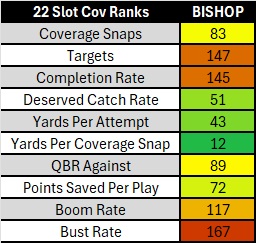Thanks to our Alex Kozora’s training camp reports, we’ve learned that CB Beanie Bishop Jr. has dominated the first team slot corner reps, a position that has one of the largest questions of who could fill that role. So far, that man has been Bishop, especially now that Grayland Arnold is on IR.
Considering this, I wanted to look at Bishop’s last season with quantity slot reps. That was in 2022 with Minnesota, prior to seldom usage with West Virginia last season. This should answer many questions on his play in the slot, that will pair nicely to my previous overall college and NFL coverage studies, along with this 2023 slot coverage study of current Pittsburgh defensive backs.
The goal today is to see how Bishop’s 2022 slot coverage reps stacked up among his peers and what that could mean if he earns the role with Pittsburgh in 2024.
Let’s dive in. Here’s 2022 slot coverage snaps and targets for quantity context:
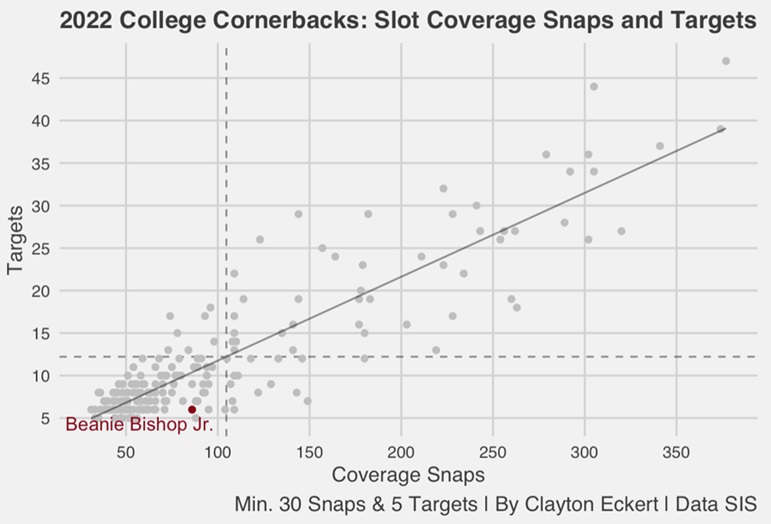
Here, we see Bishop lands on the bottom left of the visual, meaning he had below-average opportunities among the 190 qualifying cornerbacks (min. of 30 slot snaps and five targets). His 86 slot coverage snaps tied for 83rd, and he was targeted six times (T-147th).
While Bishop wasn’t utilized a ton, his targets were low in comparison. This could suggest opposing QBs were deterred from throwing at him in these slot situations. Important quantity context as we continue.
Now let’s begin to examine the quality of play with completion percentage and deserved catch rate, which is the number of completions and drops divided by the number of catchable targets and passes defensed:
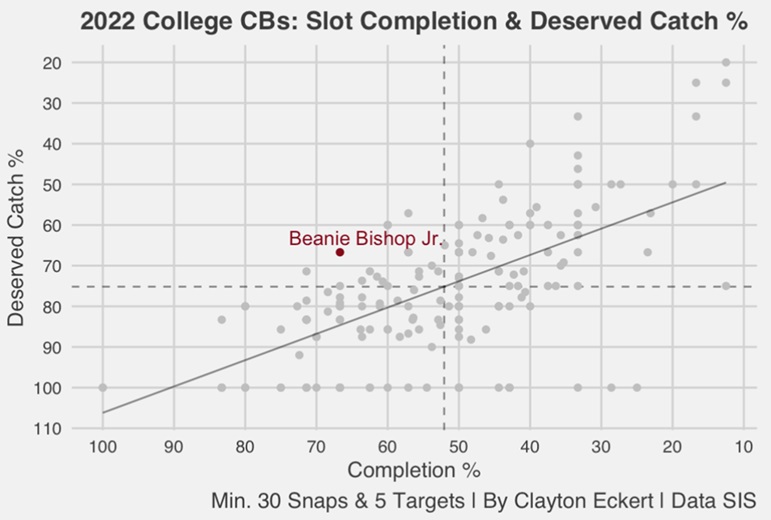

The good news was Bishop’s 66.7 deserved catch rate, landing above the mean among his peers, and tying for 51st. Considering the additional factors that the deserved catch rate measures, that’s nice to see.
Here are more specifics on Bishop’s six targets: six catchable passes, four completions, and two passes defensed. Bishop had a direct impact on the incompletions, breaking those passes up when aligning in the slot.
The other side of the coin was allowing a 66.7 slot completion rate, tying for a below-average 145th. Despite it being the same percentage as his deserved catch rate, we see that several other college corners provided better results in that regard from slot alignment.
Next, let’s look at the yardage of the targets with yards per attempt and yards per game:
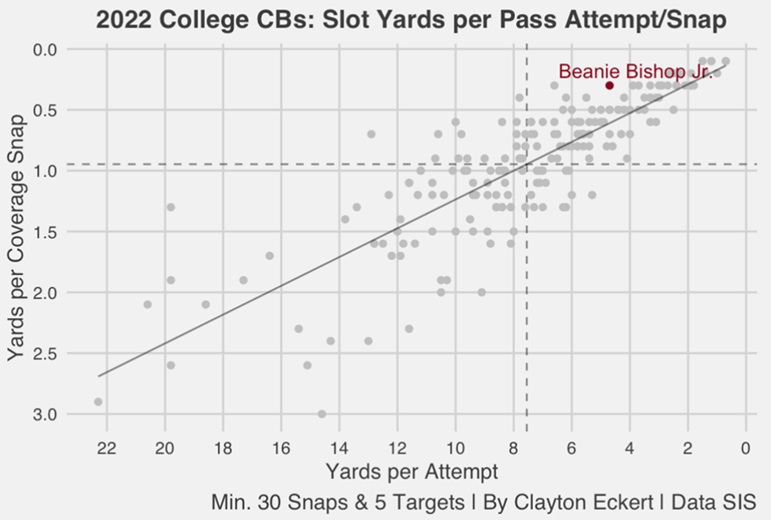

This adds very encouraging context to the previous view. We saw Bishop allow a high completion rate compared to his peers but fared very well at stopping those plays for minimal gains overall.
Bishop’s 4.7 yards per attempt tied for 43rd, along with an outstanding 0.3 yards per coverage snap that tied for 12th best out of the 190 qualifiers. This is very positive to see and points to an ability to read and react downhill quickly in the pass game. Whether it’s slot or outside corner, Pittsburgh certainly values that.
Another stat used often to evaluate defenders in coverage is QBR Against (factors in completions, yards, touchdowns, and interceptions), so let’s see how they fare along with points saved per play (PSPP – The total EPA responsibility while in coverage using the Total Points system that distributes credit among all players on the field for a given play, with positive numbers being good.
Totals are scaled up to map to the average points scored or allowed on a team level, with the player’s snap count determining how much to adjust. For pass defenders, this includes accounting for pass rush, broken tackles, dropped interceptions, turnovers, and turnover returns.):
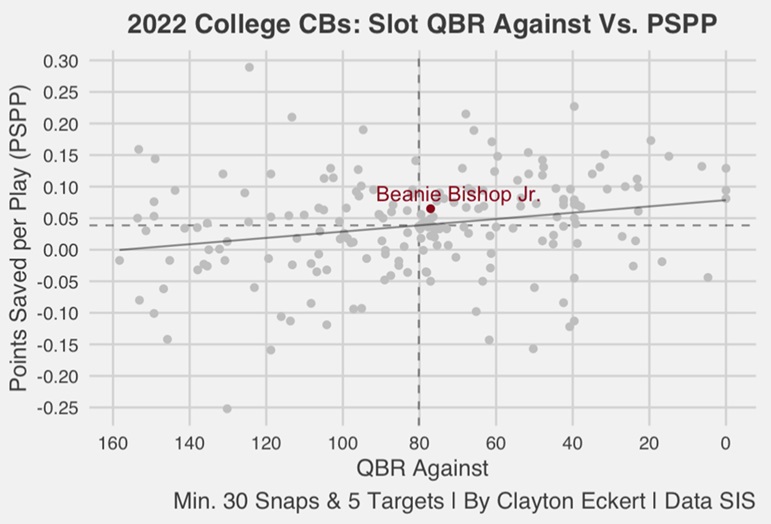

Less so than the prior view, but Bishop was above the mean in both data points once again. His 77.1 QBR Against tied for 89th (just above-average), along with a positive 0.065 PSPP mark that tied for a stronger 72nd. Yes, those ranks don’t sound awe inspiring, but very encouraging to see him land above-average in these data points that measure his impact on games.
Let’s look at SIS’s Boom and Bust percentages to see the rates of big plays allowed or made in coverage.
- Boom % = The percentage of dropbacks that resulted in an EPA of 1 or more (a very successful play for the offense)
- Bust % = The percentage of dropbacks that resulted in an EPA of -1 of less (a very unsuccessful play for the offense)
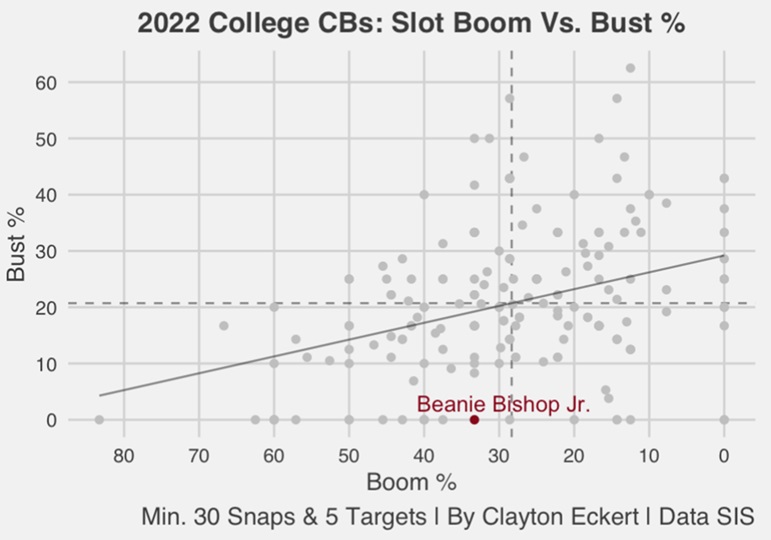

This is the flipside to the previous view where Bishop made some plays in slot coverage. But, these stats focus on the extreme positive and negative plays, with Bishop’s impact lacking in comparison.
Particularly having no bust plays, including no interceptions. For context, 24 qualifiers had a 0.0 bust rate, so this wasn’t limited to Bishop, but unfortunate to see in his final college season with reasonable slot snaps.
Bishop allowed a 33.3 slot boom rate, landing below-average as well, and tying for 117th. A better result than his absent bust rate but not ideal. On 65 intended air yards, Bishop allowed 28 passing yards, no touchdowns, and was once flagged for a defensive pass interference.
None of that seems egregious, but the EPA stat used in these data points emphasize Bishop’s slot targets not having the extreme impact on the game that was true for several of his peers.
He has showcased an ability to make bust plays though. It just so happens that 2022 was a down year. Over his college career, Bishop had 30 passes defensed, seven interceptions, and just one touchdown allowed regardless of alignment.
Seeing him barely being utilized from the slot last season, when he provided most of his total production (20 passes defensed, four interceptions, no touchdowns), is a bit discouraging considering that’s where he would likely line up in Pittsburgh.
A flipside was his 2021 season in the slot, when he had five passes defensed, all three of his interceptions, but did allow a touchdown. Yes, that was a few seasons ago, but has encouraging production that waned particularly in quantity his final two college seasons.
Here’s to hoping Bishop can continue to display confidence and abilities for the slot corner role in Pittsburgh. If so, a similar study on Bishop’s 2021 season in slot coverage will be coming soon.
To close, here’s a wrap up rankings table of the stats:
